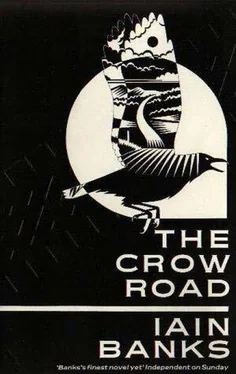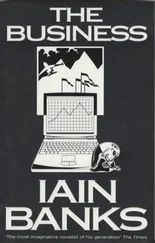Iain Banks - The Crow Road
Здесь есть возможность читать онлайн «Iain Banks - The Crow Road» весь текст электронной книги совершенно бесплатно (целиком полную версию без сокращений). В некоторых случаях можно слушать аудио, скачать через торрент в формате fb2 и присутствует краткое содержание. Год выпуска: 1992, Жанр: Современная проза, на английском языке. Описание произведения, (предисловие) а так же отзывы посетителей доступны на портале библиотеки ЛибКат.
- Название:The Crow Road
- Автор:
- Жанр:
- Год:1992
- ISBN:нет данных
- Рейтинг книги:5 / 5. Голосов: 1
-
Избранное:Добавить в избранное
- Отзывы:
-
Ваша оценка:
- 100
- 1
- 2
- 3
- 4
- 5
The Crow Road: краткое содержание, описание и аннотация
Предлагаем к чтению аннотацию, описание, краткое содержание или предисловие (зависит от того, что написал сам автор книги «The Crow Road»). Если вы не нашли необходимую информацию о книге — напишите в комментариях, мы постараемся отыскать её.
The Crow Road — читать онлайн бесплатно полную книгу (весь текст) целиком
Ниже представлен текст книги, разбитый по страницам. Система сохранения места последней прочитанной страницы, позволяет с удобством читать онлайн бесплатно книгу «The Crow Road», без необходимости каждый раз заново искать на чём Вы остановились. Поставьте закладку, и сможете в любой момент перейти на страницу, на которой закончили чтение.
Интервал:
Закладка:
I didn't think I was crying, while I was on the phone; I felt calm and in control and I spoke quietly to my mum, who sounded trembly and yet flat-toned, and told me what had happened, but after I'd put the phone down I found that my eyes were full of tears and my cheeks wet with them. They'd dribbled round my chin and onto my chest, inside the open shirt.
"Oh dear," I said, feeling that I ought to feel embarrassed. Ash handed me a clean tissue, and I dabbed myself dry.
"I'll drive you back," Ashley said, squatting in front of me in the hall, my hands gathered in hers, her long face serious, eyes shining.
"You've drunk too much. We've both drunk too much," I said.
"Anyway, you've got to get to London, start your new job." I took a deep breath. "Thanks, though." I bent forward, kissed her nose.
She put her head down. I sat back in the seat again and gazed over her head at the white-painted wallpaper on the far side of the hallway.
She looked up into my eyes. "What happened, Prentice?"
I shrugged. "Crazy," I said, my gaze sliding away from those sternly concerned eyes, to look at the worn hall carpet and an old red wine stain from a party two years ago. "Just crazy."
Ash patted my hands. "I'll take you down in the morning, then. I can get them to hold the job. There was no rush. Only if you want."
"I don't know," I said, and really didn't. I bent forward, put my head between my knees and stared at the black-taped edge of the carpet under the seat and the rough floorboards beyond. I felt Ash stroke my head, her hands soft and gentle through my hair.
I didn't want to go to bed and anyway could not have slept. She stayed up with me, and we finished the real coffee and then the instant. I talked about the family, about Rory and Fiona and mum and dad. Thunder rolled over the city, just before sunrise, and I found myself laughing, sitting there on the couch, in the living room with Ashley; laughing at the thunder. She held me, shushed me. The dawn came up dull at first, then the clouds cleared from the west and a bright blue day was there. Ashley left a note for Gav and Janice, helped me pack a bag — I couldn't decide on anything — then we left. The old 2CV, freshly pillar-box red after its latest re-spray, puttered through the near-empty streets of the bright and silent city, and rocked and rolled its way back down towards Gallanach.
The weather was perfect, the new day glorious. I talked incessantly and Ash listened, sometimes smiled and seemed always to have a kind word.
We arrived at Lochgair about breakfast-time, with the sun shining through the trees and the birds loud in the garden. Ashley stopped the car at the opened gates at the end of the drive where it entered the courtyard. "I'll drop you here, okay?" she said. "Oh, come in," I told her.
She shook her head, yawned. Her long fawn hair shone in a beam of sunlight coming through the car's open side window. "I don't think so, Prentice. I'll get home, get some sleep. Give me a call if there's anything I can do, okay?"
I nodded. "Okay."
"Promise?" She smiled.
"Promise," I said.
She leaned over, put one hand behind my head and kissed my forehead. I heard her take a breath, like she was about to speak, but then she exhaled, just patted my head. I put one arm round her, held her for a moment, then pulled away, reached into the back and got my bag, opened the door and got out. "Thanks," I said.
"It's okay, Prentice," she said.
I closed the flimsy door. The car revved up and turned round, one skinny front wheel poking out alarmingly from its wheel arch. The little Citroen clattered off down the drive. Ashley stuck one hand out of the window and waved; I raised my arm, and held it there as I watched the car head away under the trees through the dappling light. It paused at the main road, then turned away, its noise soon lost in the background of bird-song and wind-ruffled leaves.
The cool morning air smelled clean and fresh; I took a deep breath and rubbed my smarting eyes, feeling spaced-out from lack of sleep.
Then I picked up my bag and turned to the house.
It was a well-travelled country, dad told us. Within the oceanic depths of time that lay beneath the surface of the present, there had been an age when, appropriately, an entire ocean had separated the rocks that would one day be called Scotland from the rocks that would one day be called England and Wales. That first union came half a billion years ago. Some of those rocks were ancient even then; two billion years and counting, and shifting and moving across the face of the planet while that primaeval ocean shrank and closed and all that would become the British Isles still lay south of the equator. Compressed and folded, the rocks that would be Scotland — by then part of the continent of Euramerica — held within their crumpled, tortuously layered cores the future shape of the land.
By a third of a billion years ago, that part of Euramerica lay on the equator, covered by great fern forests that would be buried and folded and pressed and heated and so turn to oil and coal, in the future that was yet to come. Meanwhile the mass of rocks, afloat on the molten stone beneath, were heading slowly northwards, and sundering; the climate became hot and the rains sparse; the great dinosaurs, tree-tall and house-heavy, tramped slowly through a semi-desert while a new ocean opened to the west. After the dinosaurs had gone, and while the Atlantic still grew, the volcanoes erupted, smothering the old rock on the surface under their own vast, deep oceans of lava.
The land then held mountains higher than Everest, but they were worn down eventually by nothing harder than wind and water, until, much later still — now that Scotland was level with Canada and Siberia and the earth cooler — the glaciers came, covering the rocks with their own chill, inverted image of the old and weathered lava plains. The sheer mess of that frozen water etched the mountain rock like steel engraving glass, and pressed the roots of those fire-floating hills deeper into the dense sea of magma beneath.
Then the climate changed again; the glaciers retreated and the water they had held filled the oceans, so that the waters rose and cut what would eventually be called the British Isles off from mainland Europe, while the scoured, abraded hills to the north, set free at last from that compressing weight of ice, rose slowly back out of the earth, to be colonised again by plants and animals, and people.
On walks, on day trips and holidays, he found and pointed out the signs that told of the past, deciphering the symbols written into the fabric of the land. In Gallanach, we saw the bright seam of white cretaceous sandstone that had provided the Gallanach Glass Works with raw material for a century and a half. On Arran, he showed us rocks folded like toffee, ribboned and split; on Staffa, the even, keyboard-regular columns of cooled lava; in Edinburgh, the rubble-tailed stumps of ancient volcanoes; in Glasgow, the black, petrified remains of trees three hundred million years old; in Lochaber, the parallel roads that marked the shores of lochs dammed and un-dammed by glaciers, millennia earlier; throughout Scotland we saw hanging valleys, drumlins and corries; and in the Hebrides we walked the raised beaches where the ocean swells had crashed until the land rose, and touched rocks two and a half billion years old; half as old as Earth itself; a sixth of the age of the entire universe.
Here was magic, I remember thinking, as we drove north towards Benbecula one day, looking out at the machair, gaudy with flowers. I was just old enough to grasp what dad had been telling us, but still young enough to have to think about it in childish terms. Magic. Time was Magic; and geology. Physics, chemistry; all the big, important words dad used. They were all Magic.
Читать дальшеИнтервал:
Закладка:
Похожие книги на «The Crow Road»
Представляем Вашему вниманию похожие книги на «The Crow Road» списком для выбора. Мы отобрали схожую по названию и смыслу литературу в надежде предоставить читателям больше вариантов отыскать новые, интересные, ещё непрочитанные произведения.
Обсуждение, отзывы о книге «The Crow Road» и просто собственные мнения читателей. Оставьте ваши комментарии, напишите, что Вы думаете о произведении, его смысле или главных героях. Укажите что конкретно понравилось, а что нет, и почему Вы так считаете.












